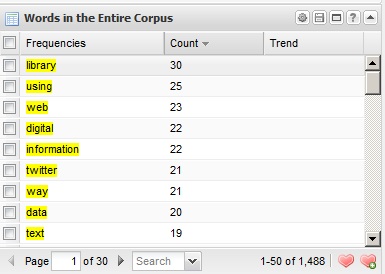 These are most common words I have used on this blog since I began writing it back at the beginning of October. I feel, looking at this representation exported from Voyant tools, that I must have been on the right track. It was actually even more interesting, from a writerly point of view, to leave a few of the stop words in, as what resulted gave me an indication of boring words that I tend to overuse. “Particularly” seems to be one of them… I might have to give thought to this before I hand in my final essay!
These are most common words I have used on this blog since I began writing it back at the beginning of October. I feel, looking at this representation exported from Voyant tools, that I must have been on the right track. It was actually even more interesting, from a writerly point of view, to leave a few of the stop words in, as what resulted gave me an indication of boring words that I tend to overuse. “Particularly” seems to be one of them… I might have to give thought to this before I hand in my final essay!
In the final lab of DITA we attempted to obtain Twitter metrics reports, however, given that I have only Tweeted a handful of times since the course began, my results were singularly uninteresting, and I couldn’t seem to get the program to work properly so I won’t publish the results here. This is not to say I haven’t been using Twitter during this time. As well as following up my classmates’ links and suggestions, I have also used it to track the protests post the Ferguson verdict, read feedback and comments from students using the library I work in, found out the details of various incidents I have passed while cycling to work and discovered details about what some of my favourite bands are doing. All of this data I have generated and accessed has covered vast swathes of my life and has made me realise how useful open access to data, via APIs and beyond, can be for people developing apps to help us get on in our lives. It also scares me a bit, when you look at the ways that companies such as Uber are using data to invade people’s privacy.
The move towards open data generated from research has been prominent in the university in which I work – well – talk of open data has been prominent, whether or not the university eventually sets up a repository similar to the institutional repository we currently have remains to be seen. Increasingly it is being recognised that researchers providing their raw data will, as the Open Data Initiative says, contribute “economic, environmental, and social value” to society. If research is publicly funded, it stands to reason the public should have access to results. And as I mentioned before, the ability to utilise this kind of data, to mash up different applications really can’t be underestimated, considering the kinds of things that people are creating, such as this woman’s mission to make it easy for people to locate public toilets in Denmark. Someone needs to do that for London!
What has been interesting, and slightly uncomfortable for me throughout the last 10 weeks of DITA is that, while on the one hand I can definitely see the need for librarians and information specialists getting a handle on these kinds of technologies, on the other hand it seems to run very parallel to what companies and corporations are doing (such as Uber). The difference being, I guess, that we’re not in it to (necessarily) make money off of people, but much of it does feel a bit like we’re learning business analyst tools. In fact, a friend of mine recently got a job working with “big data”, and her company does market research and the like for various big companies. We’ve been able to share a lot of knowledge in the last few weeks, and while I realise it is reactionary (and probably a bit technophobic) of me to feel uncomfortable, there is a bit of “I am training to be a librarian after all, not help car companies sell cars!”.
But I think this will be the (future) role of librarians; to help the public to gain/retain control of their own information and understand what is being done with their data, as well as navigate copyright limitations and in an academic context, promote useful data analysis tools to students. To that end I am pleased to have been given these leads to follow up and look forward to integrating them into my work within the library..

Not sure if you saw the article Library as Infrastrucure (https://placesjournal.org/article/library-as-infrastructure/) I posted on Twitter earlier but reading your post made me think of it again. At one point it says:
“I’d venture that there is room for entrepreneurial learning in the library, but there also has to be room for that alternate reality where knowledge needn’t have monetary value, where learning isn’t driven by a profit motive. We can accommodate both spaces for entrepreneurship and spaces of exception, provided the institution has a strong epistemic framing that encompasses both.”
It sounds like you have been grappling with that epistemic framing as part of your DITA journey. Hope it wasn’t too uncomfortable!
LikeLike